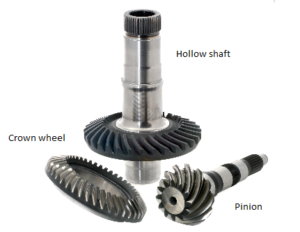Visit to GKN Driveline Köping (KOP)
The departure to Shanghai is approaching! Visa problems and changes in the Chinese foreign employee policy have made the departure delayed compared to what was originally intended. I should actually have left last Saturday. Now, I estimate that it is approximately a month to go before I can start my next placement. In the moment of writing this blog post, I’m sitting in the waiting room at the hospital in Trollhättan, NÄL, after just having undergone a chest X-ray for the sake of the work visa application process. The documents and the check-ups needed to work in China are many, but the thought of how cool and interesting it will be to work in the automotive industry in Shanghai makes me endure all of it with joy! Given that it is my first work experience in the automotive industry, I have a lot to learn. I have recently found out that I will be working together with the procurement team from GKN Driveline Köping (KOP) when I’m at the IPO office (International Purchasing Office) in Shanghai. My future boss in China thought it a good idea to send me on a study visit to KOP to learn about GKN Driveline in general and KOP and their products in particular.
GKN Driveline can be divided into two product divisions. In one of the product divisions CVJs (constant velocity joints), prop shafts and drive shafts are being manufactured. Within GKN this is done eg in Birmingham, UK. A CVJ enables the drive shaft to transmit power through a variable angle at a constant rotational speed without significant increases in friction.
In the second product division AWD (all wheel drive) is manufactured. Within GKN this is done Köping, SE and in Newington, US. The PTU (the lump in the back) and FDU (the lump up front) is what constitutes the four-wheel drive. If the car from the beginning is a rear wheel drive the power needs to be transferred to the front wheels via a gearbox. In that case a third lump is needed on the prop shaft.
KOP manufactures and assembles all-wheel drive systems. The parts needed for the four-wheel drive that are not manufactured on site are purchased before assembly. At KOP aluminum housings, pinions, crown wheels and shafts are being machined. The expertise lies in the production of hypoid gears. The cogs of the hypoid gears are helically shaped (see picture) and the hypoid gears can transfer force at almost any angle and are useful in torque-demanding applications.
One thing that is really hot on the market right now is growing fast is the AWD Disconnect system. AWD Disconnect is an intelligent system which means that the all-wheel drive can be switched off when it is not needed, which, during normal driving, is the case most of the time. The intelligent AWD system reacts to the driving conditions by disconnecting the major, rotating drive line components, which reduces fuel consumption. When the AWD system is needed the disconnected parts are activated in under 300 milliseconds.
The site in Köping, with around 1,000 employees, impressed me. First of all it looked really nice! They’re making a major facelift at the factory. The head office was renovated inside and out, built new offices are being built in the workshop and many machines are being upgraded and/or replaced. It really is a site that inspires and the huge investments being made bring a feeling of a bright future.
As always, when I visit a driveline site, I am struck by the huge differences compared to the aviation industry. Everything is moving so much faster! Products flow past in huge volumes and high speeds and the automated robotic arms move constantly. Small, unmanned robots that you give way to transfer goods around in the factory. KOP has an annual capacity of hypoid gears of just over one million. At GKN Aerospace in Trollhättan, we have one product with a lead time of about 10 months. It is natural that there is a big difference in the speed between the production of the aerospace and automotive industries! In order to deliver the large volumes of products that the automotive industry does a LEAN mindset that is fully incorporated into the business is required. This is also noticed in Köping where the entire plant is built according to how products flow.
KOP is clearly an impressive place and I look forward to working with them in the future!

